
- theintercept.com The Only Kind of “Political Violence” All U.S. Politicians Oppose
The Trump rally shooting in Pennsylvania reveals a bipartisan consensus about what constitutes political violence — and who should wield it.

The issue, rather, is what picture of “political violence” this messaging serves: To say that “political violence” has “no place” in a society organized by political violence at home and abroad is to acquiesce to the normalization of that violence, so long as it is state and capitalist monopolized.
As author Ben Ehrenreich noted on X, “There is no place for political violence against rich, white men. It is antithetical to everything America stands for.”
- thereader.mitpress.mit.edu How George Orwell Paved Noam Chomsky’s Path to Anarchism
Robert Barsky examines the profound impact of "Homage to Catalonia" on Noam Chomsky's early embrace of left-libertarian and anarchist ideologies.

-
An online anarchist research group concerning math and economics
cross-posted from: https://lemmy.dbzer0.com/post/23178144
> Hi! > I am a part of online anarchist research group concerning math and economics, if you would like to join it please comment or write a DM so I will share with you a discord link from which we are collaborating.
-
Anarchism and addiction recovery
cross-posted from: https://lemmy.world/post/16439577
> What have been some anarchist organizations or approaches to the problems of addiction and recovery? I've done a little bit of reading on the anarchist library and I'll continue with that. I know there are concepts of radical sobriety as well as critiques of the hierarchy within twelve step programs and the idea of addict as identity. I'm interested in any perspectives and ideas. > > Something I personally find acutely annoying about recovery programs is that they're almost solipsistic not just about the profits involved and the larger political historical and economic story of addiction. Maybe it's taboo because it's not something one can solve the same way one can make choices in one's own life, but I feel like a bit of a pariah every time I want to remind people that we arent just fighting ourselves but the people who actively make money on our suffering. To me right now anarchism is the best model to describe reality, so I want to know how people who share this model have dealt with and thought about these urgent issues. Keen to be introduced to literature or communities in this vein
-
Emma Goldman: My Disillusionment In Russia

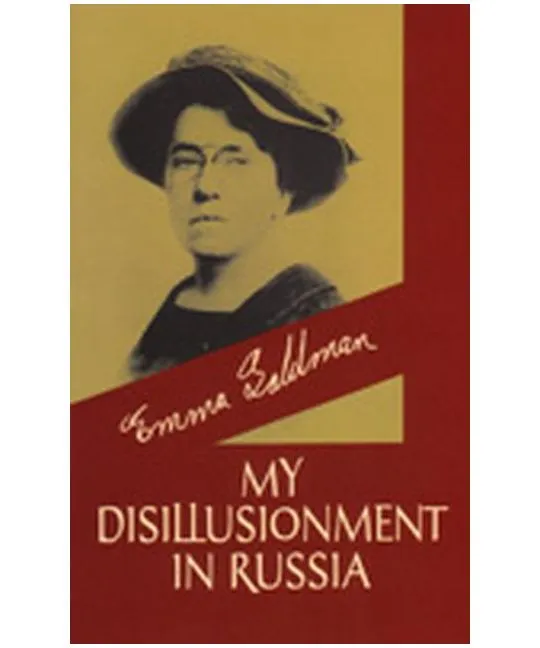
There are very few books on anarchism or anarchist authors in Poland - and even fewer female authors.
Such names of female anarchists as Lucy Parsons, Voltairine de Cleyre, Maria Nikiforowna, Louise Michel, Maria Orsetti and others are completely unknown.
No wonder: no books are published either by them or about them.
The exception is Emma Goldman, although even so, most often people know only one quote from her (and that without knowing the context in which she famously said the words), although fortunately a book "Anarchism and Other Essays" was published many years ago.)
There is a chance to translate and publish another book by Emma Goldman entitled "Anarchism. "My Disillusionment with Russia." Like many others, the October Revolution (or, as some anarchists prefer: counter-revolution) disappointed Emma, who watched its course in detail.
The question is: does anyone have and can give or lend this book? If not, can anyone recommend where to buy it from? So far I've only been able to find it on Empik and Amazon, and surely there are better places to get this title.
*As far as I know, the publication of this book has encountered censorship problems. So please give me a hint which edition of this book is the best, probably even approved by the author.
-
What are some unexpected items that are helpful to donate to a well-supplied Free Palestine university encampment?
cross-posted from: https://slrpnk.net/post/9766793
- avtonom.org Dmitry Petrov – The Path of an Anarchist
On April 19, Dmitry Petrov, a Russian anarchist fighting on the side of Ukraine, died in battle near Bakhmut. Listen in Spotify. For almost twenty years, Dima contributed immensely to the anarchist movement in Russia and Ukraine. Over the last ten years, we had only met once and our paths rarely cro...

cross-posted from: https://slrpnk.net/post/9430955
-
I'm searching for people interested in creation of remote, horizontal game dev worker cooperative
cross-posted from: https://lemmy.dbzer0.com/post/20011741
> Hi! > > As I wrote in the title I'm looking for people interested in such an endeavor. I already tried creating such a project but due to internal disagreements it didn't pan out, still I am very interested in trying this out. Game dev is very susceptible to exploitation from capitalists which is very unfortunate given that means of production are essentially socialized already - we have FOSS software like Godot that is enough to create very elaborate projects and we can collaborate remotely so no land is needed either. This makes it I think a very fruitful direction to go, because costs of game dev are not very big and returns can be big if the game is successful. I know that there is a huge competition in game dev, but given that in worker cooperative nothing is siphoned by capitalists at the top I think it's not impossible to get to the level of subsistence on game dev, while being able to affect the culture and promote cooperativism among the general population and among video game creators. I don't have a specific game dev experience but I like solving complex problems and I am interested in doing a worker cooperative, I already did quite a bit of research during my previous attempt at this type of worker cooperative and I would for this coop to get inspiration from Igalia, Motion Twin and Sociocracy. At my last project people had issues that I am fine with anti-foundationalist philosophies so please consider that I like those and I like to discuss from those lenses. I am very good at self-directed learning and I could especially do stuff like coding, design, writing plot and characters, I could research some more legalistic side of cooperative but it would be nice certainly to have someone who has some expertise here. That still leave places for people interested in audio and graphics and I am very fine with redundancy in some aspects of the required "expertise", still I am a big believer in learning by doing and getting feedback and improving based on this feedback so I am mostly looking for people willing to learn, explore and collaborate to hopefully create something cool. I would like to create games such as Planescape Torment, Disco Elysium, Hotline Miami, FTL: Faster Than Light, Spec Ops: The Line, Portal 2, Undertale, Getting Over It, The Talos Principle, Vampire the Masqurade: Bloodlines, KOTOR 2. If you are interested in this project please get in touch, we may correspond a bit and see if we would like to collaborate! > > I somewhat wonder about trying to release those games on FOSS licenses (still with asking for “paying” for them to support the creators), that would be “purer” from anarchist perspective than using proprietary license but this is not something I have thought about that much. The pro would be it being impossible to get the license stolen how almost happened to Disco Elysium creators.
-
Some students from #Lille (in #France), who are currently occupying the university campus of Lille 3 "Pont de Bois" to protest against the genocide happening in #Gaza, wanted to show their support to


Some students from #Lille (in #France), who are currently occupying the university campus of Lille 3 "Pont de Bois" to protest against the genocide happening in #Gaza, wanted to show their support to the Palestinian anarchist group, Fauda !
Free #Palestine ! Force à #FAUDA !
-
Finding an affinity group?
I'm interested in getting involved with anarchistic and consensus-driven activism... But where the hell do I start?
There's a semi-local Food Not Bombs, but they aren't meeting at the moment (protesting I imagine).
Are there similar groups I could look for? Are there social media type places I should look? Any kind of newbie infoshops?
I'm shit at making just regular acquaintances, so finding a specific kind of group has been a headache.
Thanks in advance
-
Happy May Day!
My favorite author posted this for May Day. I think its an important message in the midst of anti-genocide protests on college campuses and around the world.
Never lose hope!
-
Pro-union and anarchist propaganda
Hey y'all, for mayday I'm wanting to spread some leaflets, zines, etc around the hospitals in my area. Does anyone have any recommendations for pieces geared towards the medical field?
- theanarchistlibrary.org Camus, Albert and the Anarchists
Nick Heath Camus, Albert and the Anarchists Spring 2007 Organise! magazine looks at the life and work of the great existentialist writer Albert Camus.

-
Challenge to spread anarchism during the first week of May
mastodon.social AFCC (@[email protected])Attached: 1 image Participate in our challenge to spread anarchism around the world! #anarchism #zine #challenge #propaganda #anarchistmay
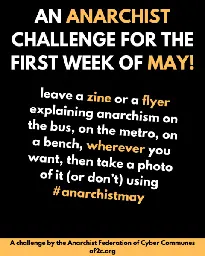
-
Emergency Social Security Campaigns Meeting – THIS Sunday
Emergency Social Security Campaigns Meeting Sunday 21 April 2024 3 – 4.30pm
Join Zoom Meeting https://us06web.zoom.us/j/88958156364?pwd=ah3dyMFY3y20G1HajLzZaLNVa3wKag.1
Meeting ID: 889 5815 6364 Passcode: 069808
We have called this meeting to bring together all those worried by and/or wanting to fight back against the Tories’ current all out assault on Disabled people, culminating in Rishi Sunak’s announcement today with plans to cut access to social security for millions of people.
For anyone who is worried, please remember that some of these changes may take time to roll out and others will only affect new claimants not existing ones.
For accurate information on what the key changes announced this week are see:
-
What alternative is there to price-gouged goods?
Yes, I know the answer is "don't buy them".
Anyway: I've been seeing posts in places that follow the format: "Look how item X in (rich country) costs the same or is more expensive than in Poland"
Admittedly, those posts aren't about basic necessities. They are about football tickets and the stadium beers or about Subway sandwiches. Although from personal experience, I know that this is happening with groceries as well. Inflation and the war across the border was a great excuse to hike the price of some goods. This doesn't seem just to me, given the wage disparity between say Ireland and Poland. But hey, you gotta get that YoY 20% growth somehow. Poland being the poster child of "look what capitalism does".
So when we take the example of buying groceries to stay alive, what alternative do you have to the large stores that are obviously fucking you over? I can afford to pay those inflated prices, I just don't want to affirm the effectiveness of the "let's hike the prices of everything because we have the excuse to" master plan.
Here are some loose (privileged), perhaps not particularly good ideas that I've had:
-
Buy food from the inflation basket The Polish (and others probably too) statistical institution keeps a "secret" basket of items based on which the inflation is calculated. It's clear that at least some of those items are known to the stores, because they always cost less, to artificially keep the inflation down. This could work, as long as the stores don't drop the ball on the quality.
-
Buy local? The thing is that while a supermarket chain has a team of people trying to get people to buy more stuff, the humble farmer selling stuff on the local vegetable market does not.
The same goes for clothes, as I could get bring my own materials and get some made by a local tailor, rather than buying off-the-rack chinesium from Zara. And look a little more old school wearing it. Though a tailor is a different level of service.
My local fancy soap shop is several times more expensive than just buying generic tallow bar soap. Sure it's made by local workers within my city, but that's part of the value, hence the price hike.
-
- www.theguardian.com Sunak accused of launching ‘full-on assault on disabled people’
PM criticised for personal independence payment review amid ‘spiralling’ disability welfare bill
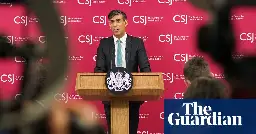
PM criticised for personal independence payment review amid ‘spiralling’ disability welfare bill
Rishi Sunak is considering withdrawing a major cash disability benefit from some people with mental health conditions, prompting claims he has launched a “full-on assault on disabled people”.
The prime minister announced fresh curbs on disability benefits on Friday, saying he wanted to explore whether some cash payments to claimants with mental health conditions could be replaced by treatment or access to services.
In a speech on welfare, Sunak said he was launching a consultation on the personal independence payment (Pip), a non-means-tested benefit paid to disabled people to help with the extra living costs caused by long-term disability or ill health.
He said that in addition to reviewing payments to people with mental health conditions, the government would look at whether some other disabled people should get help with one-off costs rather than continuing payments.
The announcement triggered an outcry from disability charities, which said the rates of people being signed off work and claiming benefits were being caused by crumbling public services, poor-quality jobs and high rates of poverty among disabled households. Mind, the mental health charity, said services for mental health conditions were “at breaking point”.
There are 1.9 million people on a waiting list for mental health treatment in England, meaning the treatment they should be able to access through the NHS is not currently available to them.
Sunak said Britain was proud to have a strong safety net of welfare payments to those who needed them, but he also said the country had a “sicknote culture” that needed to be tackled.
He said “something has gone wrong” since the pandemic to increase the number of economically inactive people who are long-term sick, especially with mental health conditions.
“Most worrying, the biggest proportion of long-term sickness came from young people … parked on welfare,” Sunak said.
He said the country could not afford the “spiralling” disability welfare bill of £69bn, which was now more than the core schools budget, and claimed the Pip budget was forecast to increase by 50% in the next four years.
Other measures he set out included:
-
Shifting responsibility for issuing fit notes, formerly known as sicknotes, away from GPs to other “work and health professionals” in order to encourage more people to return to work.
-
Confirming plans to legislate “in the next parliament” to close benefit claims for anyone who has been claiming for 12 months but is not complying with conditions on accepting available work.
-
Asking more people on universal credit working part-time to look for more work by increasing the earnings threshold from £743 a month to £892 a month, so people paid below this amount have to seek extra hours.
-
Confirming plans to tighten the work capability assessment to require more people with “less severe conditions” to seek some forms of employment.
On the review of Pip, Sunak said it may be right to pay one-off costs for adaptations, but that the payments may not need to be ongoing.
The prime minister said the government would look at whether more medical evidence about conditions should be provided, as some payments were made on the basis of “subjective and unverifiable claims”.
He said some people with mental health conditions may be better served by treatment and access to therapies rather than cash payments.
Sunak also warned about the “the risk of over-medicalising the everyday challenges and worries of life” when it came to paying benefits to people with mental health conditions.
His comments were echoed by Mel Stride, the work and pensions secretary, who told Sky News on Friday: “If you go to the GP and say you are feeling a little bit depressed, and you’re signed off, in 94% of occasions, a box is ticked that says you’re not capable of work whatsoever.
“What we want to do is change the system so that that individual will be referred to – the government is setting up something called Work Well – where they will get both the healthcare support they need, but also a work coach who will be involved to either help them stay in work if they are in employment, or to help them get into work if they’re not.”
Ed Davey, the Liberal Democrat leader, said: “Millions of people are stuck on NHS waiting lists, unable to get a GP appointment or struggling to access mental health support. Rishi Sunak is attempting to blame the British people for his own government’s failures on the economy and the NHS and it simply won’t wash.”
Matthew Pennycook, the shadow housing minister, said Sunak had been pursuing a “cheap headline” over his claims that Britain has a “sicknote culture”.
“There has been a long-term rise for many, many years under this government in people who are on long-term sickness benefits, either because they can’t get the treatment they need through the NHS, which is on its knees after 14 years of Conservative government, or they are not getting the proper support to get back into work,” he said.
Charities warned that the benefit curbs would make people’s problems worse. James Taylor, the director of strategy at the disability equality charity Scope, said the speech “feels like a full-on assault on disabled people”.
“These proposals are dangerous and risk leaving disabled people destitute,” he said. “In a cost of living crisis, looking to slash disabled people’s income by hitting Pip is a horrific proposal.
“Calls are pouring into our helpline from concerned disabled people. Life costs more for disabled people. Threatening to take away the low amount of income Pip provides to disabled people who face £950 a month extra costs isn’t going to solve the problem of economic inactivity … Much of the current record-levels of inactivity are because our public services are crumbling, the quality of jobs is poor and the rate of poverty amongst disabled households is growing.”
Dr Sarah Hughes, the chief executive of Mind, said the mental health charity was “deeply disappointed that the prime minister’s speech today continues a trend in recent rhetoric which conjures up the image of a ‘mental health culture’ that has ‘gone too far’.
“This is harmful, inaccurate and contrary to the reality for people up and down the country,” she said. “The truth is that mental health services are at breaking point following years of underinvestment, with many people getting increasingly unwell while they wait to receive support. Indeed the Care Quality Commission’s latest figures on community mental health services show that nearly half of people (44%) waiting for treatment found their mental health deteriorated in this time.”
Iain Porter, a senior policy adviser at the Joseph Rowntree Foundation, said the prime minister had launched an “irresponsible war of words on people who already aren’t getting enough support, which the government would rather not talk about”.
“Many people want to work, as the prime minister says, but have their hopes dashed by woeful health and wellbeing support and job centres unfit for purpose,” he said.
The British Medical Association said the prime minister should focus on getting people access to the medical help they needed to get back to work rather than “pushing a hostile rhetoric on ‘sicknote culture’”.
-
- freedomnews.org.uk Russian Anarchist "will finish tenth grade in pre-trial detention" - Freedom News
Lyubov Lizunova is accused of terrorism for a "Death to the Regime" graffiti and "approving" the arson of military recruitment offices
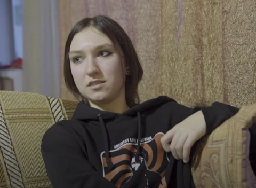
- c4ss.org From Stirner to Mussolini
Review: The Anarchist-Individualist Origins of Italian Fascism In 1910 Luigi Fabbri and Armando Borghi abducted an anarchist woman who had shamed their friend by divorcing him. Together, they forced her into a gynecological exam so the doctor could publicly pronounce her deformed and incapable of se...
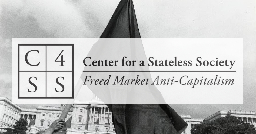
- www.thecanary.co Introducing: The Week In Ableist Bullsh*t
Sick of the press and govt constantly talking crap about disabled people? So is journalist Rachel Charlton-Dailey...

Sick of the press and govt constantly talking crap about disabled people? So is journalist Rachel Charlton-Dailey...
[Click to listen to the article, and support the Canary]
I’m often asked what needs to change to make the world a better place for disabled people. It used to be a complex answer for me. It depended on the context I was being asked, who was asking, or what had been happening recently.
But now it’s simple: the world needs to stop hating disabled people and being so fucking ableist.
Ableism has always been rife in society, media, and politics. It feels like it’s been ramped up in recent years, but especially in the last few months. A big reason for this is that the government are intent on demonising us to cover for the fact they and their rich mates are stealing from taxpayers.
How the poison of ableism trickles down
This feeding of hate from the government and media to the common man is easily done when 75% of the British media is owned by the same two, rich, Tory-supporting men. The click-driven nature of news now means government ministers can call disabled people anything they want without the press challenging it.
After all, “languishing on benefits” is a much punchier vox pop than ‘minister claims people don’t want to work but they’re actually just trying to survive’.
These views are then repeated as fact by right-wing pundits on chat shows. Eventually, it becomes the public opinion that people on sickness and disability unemployment benefits are lazy and taking the taxpayer for a ride.
What the hatred manifests into
This awful rhetoric contributes to the centuries-old stereotype that disability is something to be ashamed of. Except now, they’ve made our lives so miserable that if you dare to attempt to live a happy disabled existence you MUST be faking it to rinse those hard-working taxpayers.
It means photography companies think it’s perfectly acceptable to leave disabled kids out of school photos. Young lads feel comfortable sitting on their shit podcasts and laughing about how they wouldn’t date a “mangled” woman in a wheelchair cos they’d be worried their equally shit mates would laugh at them. Heaven forbid they consider getting better friends.
It means cunts like Matthew Parris can week in and week out call disabled people lazy fakers who drain the taxpayer and when you, for example, co-ordinate 400 complaints against him the press regulator can come back with ‘Well that’s just his opinion as a journalist‘. Well isn’t it a good job that I get to have my opinion too?
And so The Week in Ableist Bullshit was born
If the last few weeks have proven anything, it’s that there’s simply too much ableism to keep track of and the media can’t be trusted to hold all of it to account – especially when they create a great chunk of it.
One thing I have always striven to do in my work is hold those making life harder for disabled people accountable. That’s why I’m delighted to be writing this new weekly column here at the Canary. In it I will collate and dissect the barrage of crap disabled people are facing from the government, media, social media, organisations, and society.
But I also want to celebrate the great things disabled people do too, so at the end of each column will be my disabled joy of the week. Come for the ableists bashing – but stay for the hidden pockets of joy.
This week’s is a much more condensed version but from next week expect no stone to go unturned. So, shall we?
Shakespeare’s Globe doesn’t give a fuck if disabled people hate them
A few months ago it was announced that in the Globe’s latest incarnation of the ableist classic, Richard III will be played by a non-disabled performer. In my opinion, the play and role have always been an awfully over-exaggerated portrayal of the disabled villain trope.
However, the Globe lost me when it released a statement following pushback from disabled people in which they almost claimed that there was an abundance of roles for disabled people to play. The artistic director Michelle Terry, who is taking up the role, stated “it will come around again”.
Many hoped that our voices would be heard and the Globe would change its mind, but today the full cast was announced and Terry remains in the role. When I visited a couple of years ago I found their access to be exceptional.
But access doesn’t matter when the historic theatre refuse to cast us in stories about us.
The government is trying to fuck over disabled students even more
Being a disabled student is already hard, but now the Department for Education (DfE) is proposing to abolish a huge chunk of disabled students’ allowance funding.
The cuts would apply to “specialist non-medical help” which could mean students lose funding for interpreters, note-takers, and more. It will mean disabled students will be put at an even bigger disadvantage.
The consultation closes on 3 July and is open to disabled students, providers, and higher education staff. You can have your say here.
Daily Mail is back on its ‘ADHD is fake’ bullshit
There are so many stories about different ways in which ADHD doesn’t exist that I fear ‘ADHD lies of the week’ may become a permanent feature here. I swear at times it feels like the Daily Mail and the Times are having a competition to see who can whip up the most hate about people with ADHD.
This time they’re aided by exercise bore Joe Wicks who is blaming processed food for the increase in ADHD diagnosis. The fact this has been disproven many times didn’t bother the rag though.
I know the realities of being neurodivergent all too well. Swapping my safe food – chicken nuggets – for some veggies won’t make my life any easier. But these ignorant fools not speaking on issues they have no idea about will.
Disabled Joy of the Week – Keedie
In amongst all the hatred towards neurodivergent women and girls, Elle McNicoll is a constant force for good. The author’s latest offering Keedie is a prequel to her behemoth A Kind of Spark.
The book is about standing up to those who try to make you feel small and celebrating the brilliance of autistic and neurodivergent people. Attending the Autistic Girls Network online event celebrating Elle felt like a balm for my soul that had been destroyed by all the abuse we’ve endured these last few weeks.
Neurodivergent women and girls loudly being ourselves and refusing to be made small in a world that wants to make us ashamed of who we are. You can buy Keedie here.
And finally…
I wanted to leave you with something my pal told me when I was feeling guilty about treating myself. As someone who comes from poverty, the idea of frivolously spending money on myself feels wrong.
Enter T with some excellent wisdom:
> > > When you don’t treat yourself the Tories win a little bit. > >
In this terrible world it’s important that, when we can, we celebrate who we are – even if that’s by buying the cute boiler suit.
Until next week, fuck the Tories and don’t believe all you read.
- www.theguardian.com Squatters take over Gordon Ramsay hotel and pub in London
At least six people lock themselves in Grade II-listed York and Albany next to Regent’s Park and post notice
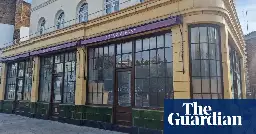
At least six people lock themselves in Grade II-listed York and Albany next to Regent’s Park and post notice
Squatters have taken over a pub in London leased by Gordon Ramsay that is up for sale with a guide price of £13m.
A group of at least six people locked themselves inside the Grade II-listed York and Albany hotel and gastropub, next to Regent’s Park, boarding up the windows and putting up a “legal warning” defending their takeover, the Sun reported.
In photographs taken before the windows were further boarded up, a person could be seen sleeping on a sofa in the bar, surrounded by litter.
On Saturday morning, two masked people wearing black tracksuits and carrying backpacks and carrier bags exited the property, running away from reporters before they could be approached for comment.
A notice taped to a door said the group had a right to occupy the venue, which they said was not a “residential building” and was therefore not subject to 2012 legislation in England and Wales that made squatting in a residential building a criminal offence.
The piece of paper, signed by “the occupiers”, also said: “Take notice that we occupy this property and at all times there is at least one person in occupation.
“That any entry or attempt to enter into these premises without our permission is therefore a criminal offence as any one of us who is in physical possession is opposed to such entry without our permission.
“That if you attempt to enter by violence or by threatening violence we will prosecute you. You may receive a sentence of up to six months’ imprisonment and/or a fine of up to £5,000.
“That if you want to get us out you will have to issue a claim for possession in the county court or in the high court.”
Ramsay called the police on Wednesday but was unable to have the people removed, it is understood.
Another notice asked passersby for “food and clothes donations or anything else you no longer want or need”.
The occupation of a person’s non-residential property without their permission is not a crime in England, though police can take action if crimes are subsequently committed, including damaging the property or stealing from it.
The Metropolitan police said in a statement: “Police were made aware of squatters at a disused property in Parkway, Regent’s Park, NW1 on Wednesday 10 April. This is a civil matter and so police did not attend the property.”
In 2007, the film director Gary Love bought the freehold of the former 19th-century coaching inn.
He subsequently leased the property to Ramsay on a 25-year term with an annual rent of £640,000.
The Kitchen Nightmares host unsuccessfully attempted to free himself from the lease in a legal battle at the high court in 2015.
The venue went on sale at the end of last year with a guide price of £13m.
According to government guidance, squatters can apply to become the registered owners of a property if they have occupied it continuously for 10 years, acted as owners for the whole of that time and had not previously been given permission to live there by the owner.
-
I fought the law... and the law lost: disabled man arrested for blocking parliament wins case
www.thecanary.co I fought the law... and the law lost: disabled man arrested for blocking parliament WINS caseNeil Goodwin was charged over his protest outside parliament in 2023. However, a judge saw it for nonsense - and here, Neil tells all.
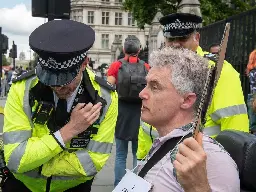
Neil Goodwin was charged over his protest outside parliament in 2023. However, a judge saw it for nonsense - and here, Neil tells all.
[Click to listen to the article, and support the Canary]
Last week the Canary ran my story A disabled man is being PROSECUTED for blocking parliament with his MOBILITY SCOOTER just before my trial at Westminster Magistrate’s Court. Here’s the full story.
The climate crisis: very real, and very now
On July 19 2023, exactly a year on from the hottest day on record, and the devastating Wennington wild fire in East London which completely destroyed four houses, I had travelled up to parliament to raise the alarm about the effects a climate catastrophe will have on the disabled community and vulnerable groups, the old, and the frail.
I have multiple sclerosis (MS) and the hottest day in 2022 really drained what little energy I usually have. I felt like the plants in my garden, completely wilted, my leaves turning brown. It was the first time that I’d had to be pushed into my garden in a wheelchair. We rescued an exhausted robin, unable to even fly up to the bird bath, cooling off in a tub of rancid water. It was truly horrifying.
In early July 2023, I attended a talk at the Southbank Centre with Greta Thunberg and was shocked to learn that the government was preparing to sign new, and very significant, oil and gas licenses.
I learnt that the Rosebank project, the UK’s biggest untapped oilfield 80 miles off the Shetland coast in the North Atlantic, would have the potential if it were burned to produce as much carbon dioxide as running 56 coal-fired power stations for a year.
So, at a time when the UN Chief António Guterres started using the term ‘Global Boiling’, to describe the acceleration of terrifying climate impacts, Rishi Sunak was preparing to effectively tear up our commitment to Net Zero and the Paris Agreement and block our only escape route from global catastrophe.
Warnings from the 1990s
I am a documentary film maker.
In the late 90’s, when ‘Global Warming’ was very much considered to be junk science, I made a film called ‘Turned out Nice Again – Britain under climate change’, which set out to show what life would be like in the-near-future, about 2060, if we failed to curb our use of fossil fuels. Stuff I thought I’d never have a front row seat to witness:
Turned Out Nice Again - Britain under Climate Change
It was during that time that I learnt that CO2 emissions take a while to affect the climate. Estimates range from between 10 to 30 years. So, the impacts we are experiencing today relate to past emissions, say the invasion of Iraq, and present emissions will affect the atmosphere roughly 10 to 30 years from now.
So, I knew that with CO2 it wasn’t simply a case of just turning off the tap. Phasing out needed to happen gradually and consistently, allowing the economy and society the time to adjust. It couldn’t be business as usual right up to the 2050 deadline, the deadline stipulated in the Paris Agreement, and then bother. It most certainly couldn’t involve utilising new oil and gas fields.
Disabled people taking a stand
So, extremely angry, I had travelled up to Westminster on a Wednesday, as I say, exactly one year on from the hottest day and the Wennington wild-fire, and at around the time PMQ’s would have been winding up and parked my mobility scooter right outside the Carriage Entrance to parliament.
I had dressed up the basket on the front to look like it was on fire, with a warning sign showing a wheelchair bound person caught between a fire and a flood; referencing the Wennington wildfire:
Also, the danger from flash flooding, which was tragically emphasised in the run up to my plea hearing by the death of an 83-year-old Chesterfield woman called Maureen Gilbert, who drowned in her home during Storm Babet, as she was unable to escape the rapidly rising water inside her terrace home owing to mobility problems.
‘I cannot run from a climate emergency’
I had carried a placard with fake flames coming out of the top that said, ‘I cannot run from a Climate Emergency’. Neither run literally, because of my disability, nor run from what I felt was my social responsibility to try and spotlight the implications of a climate emergency, not just for the disabled community, but for all vulnerable people – the old and the frail.
I had asked the first police officer who approached me, I believe my arresting officer, to turn on his body cam and record a safety announcement. Me detailing my various disabilities. I also have ankylosing spondylitis (AS), an arthritic like condition that fuses your joints, that has left me with a completely fused neck, and completely fused lower spine, called a bamboo spine.
I explained exactly why I was there, and I was told that I was liable to be arrested:
I remember asking him to see it not as an arrest, but a demonstration in how difficult it would be to save someone like me from a fire at a moment’s notice and to carry me to the safety of a police cell. To see it as an exercise in preparedness. To which, I remember him saying, ‘If you were in a burning building, I’d throw you over my shoulder and carry you out.’
And I remember thinking, if you threw me over your shoulder, it would be like throwing a 13 stone ironing board over your shoulder, as my back and neck are almost entirely fused, and you’d probably drop me and/or break my neck in the process. It certainly wouldn’t be that quick and easy.
Surrounded by cops
My plan was to attract a swarm of cops around me, then use them as bait to attract the press, thereby elevating my protest into newsworthiness, then get nicked.
No D locks, no superglue, no seriously pissed off commuters, just a very uncooperative seriously disabled man on a ‘burning’ mobility scooter, a potential public relations nightmare, saying, ‘come and have a go if you think you’re strong enough’. Or indeed, only if you’ve got suitably accessible police infrastructure. Which I had hoped to find out.
I was given every opportunity to leave, invited on numerous occasions to carry out my protest along the pavement, away from the entrance. But it felt right to remain just where I was. Right in the middle of what they like to call, ominously, The Sterile Zone:
It’s strange, but I felt both my strongest and weakest at the same time. Surrounded by cops, one of whom apparently had a best friend with MS. None of whom could lay a finger on me, through fear of breaking something.
Who knew that fragility could become a super-power? Through-out, the burning issue of climate change held aloft, perhaps barring the way of the Prime Minister, Rishi Sunak, who’s motorcade would have usually swept past right about then.
One of the police mentioned a secret tunnel right through to Downing Street and a short journey by golf cart.
Finally nicked
I was arrested under the 143 Police Reform and Social Responsibility Act 2011, which I thought was quite apt, as I sincerely believed that I was acting socially responsibly raising these urgent issues, especially for the disabled, the vulnerable and the frail. Those who would be shoved onto the front line of the government’s war against the weather.
I later found out that that particular law had made it illegal to carry a sleeping bag in Parliament Square, in answer to Brian Haw’s more than a decade of dissent and Occupy.
Unfortunately, I wasn’t plucked to safety from my flaming mobility scooter. So, no dodgy optic of me being carried away.
I waited eight months for my day in court. With countless sleepless nights, abject terror and righteousness slugging it out all through the winter, fretting over fines, and legal costs, and the bailiffs seizing my stuff. You can take the tele, but don’t take my Penny Black!
Preparing for court
So, I had done myself a favour and talked to Andy at Green & Black Cross, who straightened me out on quite a few things.
Stuff like, the district judge that I would be getting at my trial last week, having a better understanding of the law than your ordinary magistrate, preferring to be addressed as ‘sir’ or just plain ‘Judge’ to ‘Your Honour’, and that he doesn’t wear the silly Les Misérables head gear. Unlike my nightmares, where he’s also wearing a black hankie.
The good news was that I wouldn’t be getting the dodgy hanging judge Silas Reid, the one who is trying to take away jury trials, basically redact that last little bit of the Magna Carta, and does you for contempt for even mentioning the word ‘climate’. He’s terrorising Just Stop Oil in the Crown Court.
I’d decided to represent myself, as, even though legal stuff just goes right over the top of my head, I’d learn on my feet and try and blag my way through the proceedings. Apparently, you get more leeway. Plus, I’d have a great McKenzie friend, called Josh, courtesy Green & Black, to whisper advice.
Climate change and the impact on disabled people
On the day, the Crown Prosecution Service (CPS) got off to a very bad start by disclosing crucial documents a quarter of an hour before the hearing. Very shoddy, I must say. But understandable, considering the mountain of paperwork Just Stop Oil is generating. No wonder the guy looked depressed. This apparently pissed-off the judge big time.
Before we got underway, there was just time to take the plea of a Met police officer accused of groping a colleague.
Right from the off, the judge began by making it clear that the existence of a climate emergency was not in question. So, all that evidence I’d gathered, and helpfully stuffed into a ‘bundle’ for the judge and CPS, couldn’t be heard.
I’d spent a lot of time looking at the government’s National Adaptation Programme (NAP,) particularly an outlook from Stephen Belcher, the Chief Scientist at the Met Office:
> > > Climate change is happening now… Heavy rainfall events that can lead to flash flooding are expected to become more frequent and intense across the country. Summer temperatures above 40oC, seen for the first time in July 2022, will become more commonplace by the end of the 21st century. > >
Also the ‘UK Climate Change Risk Assessment’ (CCRA), the latest one published in January 2022, six months before the Wennington wild fire. Its Executive Summary sounding like an Extinction Rebellion leaflet:
> > > Climate change is happening now. It is one of the biggest challenges of our generation and has already begun to cause irreversible damage to our planet and way of life. We have clear evidence demonstrating the pace of warming in recent decades and the impacts we will face should this continue. As we redouble our efforts to achieve net zero, we must also continue to raise ambitions on adaptation to ensure the UK is resilient to the challenges of a warming world. > >
CCRA3 landed on cabinet desks in January 2022, six months before the Wennington wild fire, giving us a snapshot of what the government knew about the seriousness and challenges of climate change at that point in time.
So the case would almost entirely revolve around Article Ten of the Human Rights Act 1998, and The Freedom of Expression, and how reasonable I was acting in pursuing this right.
Eight hours of cops bleeding their hearts
The prosecution set out the issues. I was arrested blah blah blah… and showed the body cam footage of my arrest. Me looking almost sullen. Even rude. Not saying a word, as my arresting officer cautioned me.
By that time, I had had two hours of eight cops worth of near constant questions and pleading and befriending and guilt trips. ‘My best friend has got MS.’ ‘I’m a lesbian.’ ‘My dad is dying of cancer and I was planning on visiting him.’ That kind of thing. So, I looked exhausted:
My arresting officer took the stand. I counted five mentions of Just Stop Oil, who were being mass arrested on Parliament Square at the time of my action. Sorry JSO, but I was keen to distance myself from you.
The judge asked me what if there was any campaign group that I was connected to. I told him I was loosely affiliated with DPAC, Disabled People Against the Cuts, although my placard had said DPACC, Disabled People Against Climate Change.
It turned out that the Met had just the one suitably modified van to transport disabled people to the nick, codenamed Pixie1 (my old road protestor mates will appreciate the name). And that had been on its way to Croydon that day with part of the latest Just Stop Oil mass arrest. JSO had been having their last big bash before the summer recess and had pretty much used up every available van and cell inside the M25, including Pixie1.
I’d heard of the arrest of a disabled JSO protestor called Ari, who had been arrested, and witnessed the police practically begging a black cab to take her to the station, and had often wondered whether the cops could possibly handle a group action.
CPS trying their best to smear a disabled man
The CPS and the judge went to great lengths to try and ascertain the size of the gap I had left at the entrance, which they agreed was a double gate.
Did I block anyone? No.
Would I block anyone? Perhaps.
Slowly they scrolled through the grainy, partly obscured Body Cam footage looking for the right angle. Looking to see if I had completely blocked the highway, or whether a vehicle could still get by. Once I realised what they were doing I couldn’t help but give a little chuckle. I had the perfect photo taken by my mate Gareth Morris, where you could clearly see the gap.
When I showed them Gareth’s pic, and that there was plenty of space, the prosecution argued that a vehicle still wouldn’t be able to pass by safely. Whereupon the judge gave me my second spontaneous chuckle of the day, pointing out there were plenty of policeman there to stand between me and a vehicle, to make sure it was safe. He really had it in for the CPS that day.
‘Doing my bit’
I trundled my wheelchair up to the stand, where I dropped my notes, and made a futile attempt to pick them up. I told the court that according to the MS society’s website:
> > > excessive heat can often make MS worse. Which when you consider that we already suffer greatly from fatigue, often mentioned as one of the worst symptoms of MS, the promise of more days, perhaps entire weeks, of 40-degree heat, would make life impossible and intolerable. > >
I broke down twice on the stand. Once when I spoke of my devastated garden on 19 July 2022, and once when I spoke of the tragic and terrifying drowning of Maureen Gilbert, during Storm Babet, one of the people I said the government had thrown onto the front line of their war against the weather.
I told the judge that I saw this as doing my bit as a 58-year-old man and decried the 20 somethings who were being imprisoned for demanding a future. A future that I felt that I could at least now look in the eye.
A judge sees sense
We waited for the verdict for about half an hour. Me convinced that, whilst the judge might say nice things about my convictions, his hands would be tied legally.
When he came back, after the usher had demanded ‘All Stand’, and according to my friend Saskia’s excellent notes, he mentioned ‘reasonable excuse.’ That ‘The defendant was there to protest under Article 10’. That it had been about ‘Government failure and the granting of new fossil fuel leases.’ About ‘How this would affect people with disabilities. How high temperatures directly affect people with MS.’ The risk of fires, and ‘on the anniversary of the Wennington fire.’
I was so made up that I’d been successful in linking all these elements together on my day in court.
I was, ‘peaceful and dignified.’ And, crucially, there were doubts that it I ‘can be properly said to have been blocking the gates.’ That, ‘Not one vehicle entered or left’ whilst I was demonstrating, so there was ‘no evidence of obstruction.’ I was ‘fully cooperative’ and moved once I had secured my day in court. I was “passionate, articulate and honest in everything that [I] said’. I was proper blushing by this stage, but still expecting the words, ‘but’ or ‘unfortunately’.
He went on. Exploring ‘the balance of rights under Article 10’, and ‘reasonable excuse’, about ‘Zeigler’, which gets mentioned a lot. To be honest, there were loads of legals that just went over the top of my head, including the classic what the hell does that mean? line ‘The occupation was more than minor but less than major.’
I fought the law…
Whereupon, he suddenly blurted out ‘Not guilty. You are free to go.’ Leaving me to just stare into space, until the usher finally chucked me out.
So yes, I can now say that I fought the law, and the law… lost. No guesses as to what tune I first played when I finally got home.
Featured images and additional images via Gareth Morris
-
Forced treatments, sectionings, deaths, assisted suicides: the reality of ME/CFS in the UK in just three months of 2024
www.thecanary.co Forced treatments, sectionings, deaths, assisted suicides: the reality of ME/CFS in the UK in just THREE MONTHS of 2024Nearly 20 years after the NHS killed Sophia Mirza, people with ME/CFS are still dying. Why? Why has nothing the ME community done worked?

We're in the middle of a plague
[Click to listen to the article, and support the Canary]
The NHS killed Sophia Mirza on 15 November 2005. Sophia lived with myalgic encephalomyelitis (ME/CFS). In July 2003, psychiatrists got cops to smash the door into Sophia’s home down and forcibly take her to a secure psychiatric unit, where she was imprisoned against her wishes for two weeks before a tribunal ordered her release. This ultimately led to her death.
In January 2024, Olivia Jane Mott travelled from the UK to Dignitas in Switzerland to end her own life. She lived with ME. On 27 March 2024, Lucy Mayhew died. She lived with ME.
Right now, Millie McAinsh is dying in an NHS hospital because doctors don’t believe her illness is real. They previously sectioned her under the Mental Health Act, enforced Deprivation of Liberty Safeguarding (DoLS) measures on her, and are forcing her to have treatment she doesn’t want. Millie lives with ME. So does Karen Gordon – in an almost identical situation to Millie.
So, nearly 20 years after the NHS killed Sophia, people living with ME are still dying while the state either lets them or actively brings it about. The obvious question is why? Well, the Canary has extensively documented the answer to that.
However, the less obvious but perhaps more necessary question is why are we allowing this to happen?
ME/CFS: inaction, inaction, inaction
The answer to that is a complex melting pot of issues, including (but not limited to):
-
ME/CFS is still poorly misunderstood – or rather, made out by the medical profession, the state, and media to be.
-
The ME community exists in the most part of people online who are a) clued-up on the issues, and b) have a diagnosis in the first place. Read this about fibromyalgia and ME diagnoses.
-
People have their own political views which play into how they respond to situations of injustice, abuse, and discrimination. We’re a mixed bag of left, right, and no wing.
-
The full force of the media and state has been consistently putting its boot on the neck of the ME community.
-
Charities and Disabled People’s Organisations (DPOs) within the community tend to work to their own agendas – not collectively. But one of the most pressing one is the community’s inability, and in some cases unwillingness, to protest.
Where are the protests? Where are the occupations?
Campaigning, protesting, and taking direct action have throughout history been the way ordinary people have brought about change. Be under no illusions: it is NOT politicians, charities, or the state who do – and even when they have, it’s because people like you and me have forced them to.
However, this has always been the circle that (until this point) cannot be squared: severely chronically ill and disabled people cannot easily protest. They’re bodies often won’t let them. So, they need allies and advocates to do it for them.
Yet where are the protests from non-chronically ill allies?
I seem to recall some shoes being placed outside the Department of Health and the BBC a few years ago (I’m being wry – I was there). Otherwise, the ME community doesn’t protest – unlike nearly every other marginalised group in the UK.
For example, me and my partner Nicola were literally blocking one of the main arterial roads into Westminster with other disabled people a few weeks ago. It was over benefit-related deaths. Cops kettled disabled wheelchair users and threatened people with arrest.
Yet that pales in comparison to the tens of thousands of people who have died under the Department for Work and Pensions (DWP) regime; one the UN said caused “grave” and “systematic” violations of chronically ill and disabled people’s human rights.
ME/CFS: we literally have nothing to lose
So, why has the ME community not embraced direct action and protest as part of its strategy?
I can’t safely answer that. That’s for all of us to reflect on. I think there’s elements of class within this. Many marginalised communities are also socioeconomically marginalised by the state. That is, they’re poor in every sense. Specifically, not only does the state marginalise you for, say, your ethnicity or disability, it also marginalises you economically.
As American writer and civil rights activist James Baldwin summed up:
> > > The most dangerous creation of any society is the man who has nothing to lose. > >
Black people, disabled people, refugees, non-working people all have the least to lose – therefore, civil disobedience isn’t as daunting.
The ME community needs to fully recognise its own marginalisation and take that to its very core. Millie is a case in point for us all: she has little to lose, now – and things can’t get much worse.
Shut up and sit down
There’s another element to this lack of protest and direct action.
Regarding Millie, I keep seeing comments, and am also being told privately by quite well-known figures in the ME community, that:
> > > Things are going on behind the scenes. > >
But:
> > > You shouldn’t really do ‘x, y, z’ as it will make the situation worse for Millie. > >
And:
> > > The ME/CFS charities are working with Millie’s family. > >
If I hear another comment along these lines I’ll scream.
Whatever the ME charities and those in the self-appointed (which they are, unless people with ME took a vote on it that I missed) upper echelons of the community have been doing since the NHS killed Sophia on 15 November 2005 HAS NOT WORKED. If it had, Millie and Karen would not be in the situation they’re in.
Olivia would still be alive.
Lucy would still be alive.
And Merryn, Maeve, and Kara Jane would still be alive.
Nothing has worked in 20 years.
Labour MP Debbie Abrahams once said in parliament regarding the tens of thousands of disabled people that have died on the DWP’s watch:
> > > Does the minister think that it is unacceptable that any government policy should cause their citizens to take their own life or to die? If he does, should there not be a moratorium on this policy until it is got right? Surely one death is one too many. > >
Why has the ME community for decades accepted so many deaths of its own?
It is past time that the ME community realised that we are perpetually going round in circles, doing the same things over and over again – and that they are not working.
It is also past time that the ME community stopped allowing certain gatekeepers to govern how it conducts itself and how it responds to the abuse medical professionals and the state inflicts on its members; abuse that is not inflicted on those same gatekeepers.
And it is past time that the ME community stopped putting its faith in charities who take hundreds of thousands – sometimes millions – of pounds every year in donations and yet demonstrably achieve absolutely nothing with it.
That is, the ME community and its allies in other chronic illness communities like long Covid need to take matters into their own hands. Enough really is enough this time.
Get our acts together, or we are as good as dead
Larry Kramer was the founder of direct action group AIDS Coalition to Unleash Power (ACT UP). Him and his supporters advocated for disruptive civil disobedience in the face of the HIV/AIDS crisis that was sweeping the US in the 1980s.
ACT UP members repeatedly got arrested for actions like blocking roads. However, Kramer and his group changed the course of HIV/AIDS: how it was viewed by the public, how it was represented by the media, and ultimately how it was treated by medical professionals.
He once said:
> > > I was trying to make people united and angry. I was known as the angriest man in the world, mainly because I discovered that anger got you further than being nice. And when we started to break through in the media, I was better TV than someone who was nice. > >
The ME community has been “nice” for far too long. It’s not like we’re complaining about potholes, tree-felling, or London’s ULEZ scheme. We’re fighting against the state-run health service literally killing members of our community. Yet, all those three other examples I gave have seen bigger – and often more civilly-disobedient – protests than the ME community has ever engaged in.
Crucially, though, Kramer famously screamed in the middle of a meeting of AIDS activists who were arguing among themselves and utterly disorganised:
> > > Plague! We are in the middle of a plague! And you behave like this! Plague! 40 million infected people is a plague! Until we get our acts together, all of us, we are as good as dead. > >
So, get their act together they did.
The ME/CFS community needs it’s own ‘plague’ moment
The ME community’s “plague” moment should have been Sophia’s killing in 2005.
But it wasn’t.
It should have happened at the start of the coronavirus (Covid-19) pandemic.
But it didn’t.
It should have been Merryn’s, Maeve’s, Kara Jane’s, and every other person with ME’s deaths because of how the system has treated them.
But it wasn’t.
So, I ask you this: is it going to take the NHS killing Millie for the ME community to have its “plague” moment and finally ‘get its act together’? Because that cannot happen.
Millie’s story – ending with her returning home to safety – must be a watershed moment for all our sakes. It must be a moment where we as a community stare at ourselves in a mirror until our eyes collectively bleed and ask ourselves whether what we are, and have been, doing is right – and if we should continue with it.
And I can tell you now: the answer to those questions is ‘no’.
-
- theanarchistlibrary.org The Anarchist Turn in Twenty-First Century Leftwing Activism
John Markoff, Hillary Lazar, Benjamin S. Case and Daniel P. Burridge The Anarchist Turn in Twenty-First Century Leftwing Activism 14 March 2024

cross-posted from: https://lemmy.dbzer0.com/post/17910073
> cross-posted from: https://slrpnk.net/post/8363072 > > > > Leftwing activism of recent decades exhibits an anarchist turn evident in quantitative indicators like mentions of anarchists in news reports and by activists adopting anarchist modes of organization, tactics, and social goals-whether or not they claim that label. The authors of this Element argue that the very crises that generated radical mobilizations since the turn of the millennium have both led activists to reject other strategies for social transformation and to see anarchist practices as appropriate to the challenges of our time. This turn is clearly apparent in the Americas and Europe, and has reverberations on an even broader transnational, perhaps global, scale. This suggests the need for research on social movements to consider anarchists and other marginalized radical traditions more fully, not just as objects of study, but as important sources of theory. > > > >
- www.theguardian.com ‘We stand together’: Bradford Muslim and Jewish leaders join forces for Ramadan event
Religious leaders reject division and celebrate diversity at city’s first interfaith iftar

Religious leaders reject division and celebrate diversity at city’s first interfaith ifta
As politicians continue to argue and the war in Gaza rages on, leaders from the Muslim and Jewish communities in Bradford held an interfaith iftar on Wednesday evening, to celebrate the diversity of this part of West Yorkshire.
Laurence Saffer, the president of the Leeds Jewish representative council, described the similarities between practising Islam and Judaism and said it was important to attend the iftar – the evening meal held by Muslims observing Ramadan – because “it’s what we do”.
Addressing the 80-strong audience at the community centre by the historic Lister Mills – the world’s largest silk factory at the height of the city’s industrial past – he said: “I talk about the elephant in the room, which is Israel and the Palestinians. We have to talk about what we believe. Because when the Jewish community talks and somebody asks me, ‘does the Jewish community believe that the Palestinians have the right to self determination?’, the answer is a resounding yes. We do. We fully support that.
“When members continue to ask, ‘do you believe that the Jewish people are entitled to self determination?’, the answer invariably is yes, we do. We respect your rights.
“Then we say: actually, what do we disagree about as people living here in the United Kingdom? It’s often things like borders or the status of Jerusalem – which, in reality, I don’t have any influence over and neither do our Muslim friends. So when we break it down and say the things that we don’t agree on, surely there’s very little.”
Bradford has one of the largest Muslim populations and one of the oldest Jewish communities in the UK. Rabbi Dr Joseph Strauss founded the Bradford synagogue in 1873; his great-grandson Richard Stroud, a trustee at the synagogue, was at the iftar. Leaders from the Sikh, Buddhist and Hindu communities joined as well as important community figures.
This year’s Ramadan began on 10 March and is due to end on 9 April, when Eid al-Fitr celebrations marking the end of the holy month will be held. During the month, Muslims fast – which involves abstaining from eating and drinking during daylight hours – as well as focus on self-improvement, self-reflection and giving to the less fortunate.
Safina Aziz, chair of the Professional Muslims Institute, urged people of all backgrounds to call out every form of hate, emphasising the long history of partnership between the Muslim and Jewish community.
“There are many personal ties between us, we have celebrated happy times together and stood together during challenging times,” she said. “We’re all very saddened by what’s happening in both Palestine and Israel. We stand together to express our shared commitment to protecting the relationship between our communities.”
Rabbi Natan Levy, head of operations at Strengthening Faith Institutions, hailed the success of the city’s first interfaith iftar and said he hoped renewed dialogue could allow people to realise that “we have forgotten to listen to stories, we have forgotten to understand that to love another person we must know what hurts them and know how they suffer”.
skip past newsletter promotionafter newsletter promotion Ismail Patel, a Muslim from Bradford, said he liked to recognise people from different backgrounds, from the Jewish community to the Hindu community, and found it fascinating to go to their different places of worship.
He pointed to Bradford cathedral’s faith trail, in which visits to local temples, churches and mosques take place on a Saturday before a meal is shared as a sign of enduring community.
A resident in the city for 18 years, Patel said events in Gaza had affected Bradford politically. “Many people here are upset with Labour’s position over Gaza – I can see a lot of votes going to the independents during the election.”
Last October, the Labour councillors Sarfraz Nazir and Taj Salam resigned from the party over Keir Starmer’s comments on the Israel-Hamas war and joined the Bradford Independent group. They will stand in local elections on 2 May.
- yt.artemislena.eu The No State Solution: A Dialogue with Palestinian Mohammed Bamyeh and Israeli Uri Gordon
The No State Solution: A Dialogue with Palestinian sociologist Mohammed Bamyeh and Israeli political scientist Uri Gordon How can anarchist perspectives contribute to Palestinian liberation? Join Palestinian sociologist Mohammed Bamyeh and Israeli political scientist Uri Gordon as they consider th...

cross-posted from: https://slrpnk.net/post/8263274
> YT Link
-
Or Just Say Nothing: A Response to CrimethInc.’s Initial Statement on Aaron Bushnell
cross-posted from: https://discuss.online/post/6031144
> While it would be easy to dismiss this as CrimethInc [hereforth the Outlet] cautiously mitigating any potential liability if self-immolation generalizes, the rejection of the framework of martyrdom demands attention. The question is not whether Aaron qualifies as a shahid within the Palestinian context, although demonstrators in Yemen have proclaimed Aaron a “martyr of humanity” and an argument can be made for him having become an anarchist martyr in the lineage of Louis Lingg, Avalon, and Mikhail Vasilievich Zhlobitsky. The bigger issue: the Outlet’s assertion that an individual’s death, particularly in the context of the US, is the “worst of all possible certainties” reveals a deep disconnect with the context of this entire decolonial struggle. In the days following October 7th, anti-colonial anarchist thinkers such as Zoé Samudzi argued that the figure of the martyr marked a fundamental contradiction for the secular left’s ability to fully comprehend and act in solidarity with the Palestinian resistance. The martyrs constitute a force in the present for all who live and continue to struggle. Aaron framed his self-immolation as “not that extreme” compared to the ascension to martyrdom of tens of thousands in Gaza. By implying that Aaron’s choice was too extreme, the Outlet dishonors the reality of the struggle within Palestine and undercuts the potential of Aaron’s sacrifice.
-
Second Issue of the Anarchist Union Journal Coming Out Soon - Sign Up Now


Based out of Canada and made with support from around the world. Check them out anarchistunionjournal.org/ And Sign up for your free copy of the upcoming issue. anarchistunionjournal.org/contact/
-
Collective Action Problems are Not a Capitalist Plot: On the Non-Triviality of Going from Individual to Collective Rationality
Collective Action Problems are Not a Capitalist Plot: On the Non-Triviality of Going from Individual to Collective Rationality
https://wedontagree.net/collective-action-problems-are-not-a-capitalist-plot
-
Am I going crazy? I the fascist push in politics a giant scheme of multinational corporations to keep people from voting with their feet?
Pretty much the title. I find myself in discussions about ever degrading working and living conditions in the US (first and foremost) and some in germany (especially IT companies).
What just came to my mind:
If I were Microsoft, Google, Apple and Amazon (add billionaires and other billion dollar companies as you like) and wanted to make the most money possible, with my limited competence but unlimited greed and resources, I would pressure politicians to change policy for my benefit and against workers and consumers (check).
But some of the more mobile folks would move to other countries, endangering my and the cooperating country‘s income.
So, since I own the media as well, I spark fascist propaganda everywhere I can to keep people from voting with their feet.
Am I totally losing it or does this make sense?
P.S.: Sorry if this is the wrong place but I thought I‘d ask folks with diverse opinions that are open to discuss capitalist failures without shutting it down immediately.
- web.archive.org “This Is What Our Ruling Class Has Decided Will Be Normal”
On February 25, we received an email from a person who signed himself Aaron Bushnell, announcing an act of protest against the genocide of Palestinians.





